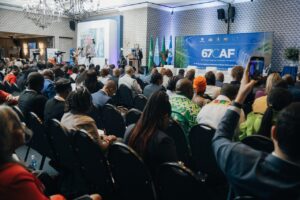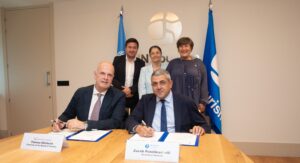Image: The Minister of Tourism Mmamoloko Kubayi-Ngubane speaking at one of the media briefings
South Africa’s Minister of Tourism, Mmamoloko Kubayi-Ngubane has re-echoed the tourism sector’s vital role in getting the country’s economy back from the ruins of the ravaging coronavirus pandemic.
The Minister who was participating in the Tourism Sector Recovery Plan Webinar said ”We have a firm belief that tourism will be one of the fastest-growing sectors in the recovery period and it will be one of the key sectors that will drive the overall economic recovery”
She told the virtual audeice that the plan to get the tourism back will be anchored on three pillars.
”The plan is a roadmap that will help us achieve this level of growth. The plan is anchored on three pillars which include:
• Protecting and Rejuvenating Supply – focusing on business continuity risks, aligning the value-chain to new biosecurity standards, preserving air access, as well as investment facilitation and market access
• Reigniting demand – this will require a robust domestic marketing strategy, the agility to respond decisively to an uncertain global environment and responsiveness to changes in consumer preference.
• Strengthening Enabling Capability – implementing mechanisms to increase ease of travel through activities such as piloting and roll-out of the proposed e-visa system to simplify the visa and entry process
Below is the full statement
Good Morning
Let me take this opportunity to welcome all of you to this Tourism Sector Recovery Plan Webinar this morning. Let me also pay a special tribute to all the women who have joined us for this webinar, and to you all, happy women’s month.
Indeed, one of the devastating things that the Covid-19 outbreak has exposed the vulnerability of women in the economy. This is because the majority of women who are economically active are in the services sector and this is the sector that has been hard hit by the pandemic. The tourism sector is one such sector that has been devastated.
The International Labour Organization estimates that women account for between 60% and 70% of the global tourism labour force. Sadly, women’s work in tourism is dominated by informality, through high staff turnover, long working hours, subcontracting, flexible working conditions, the prevalence of casual workers and seasonal variations in employment. Concentrated as they are in these vulnerable positions in the sector, it is easy to see why women are the largest causality of the constrained business environment.
It is quite evident that part of what we need to focus on in our discussion of the Tourism Sector Recovery Plan is the issue of gender equality. The issue of gender mainstreaming needs to find expression in our plan so that the recovery can be gender inclusive.
For the past three months, the situation globally and here at home has been highly uncertain, and it remains uncertain though there are signs that the rate of infection is stabilising. The pandemic has been devastating for the tourism sector and thus far, it has forced the closure of many small and medium businesses, slashed a huge percentage of income for the businesses that continue to operate and put many jobs at risk. Over this period government and the stakeholders in the tourism sector have been working closely together to try to find ways to operate in the midst of the pandemic.
Step by step, we have been marching towards the total reopening of the sector, mindful of the fact that we need to manage the risk to people’s health and lives. The pace at which the subsectors have been opening might not be ideal for businesses whose income has been haemorrhaging because government has to perform a balancing act between lives and livelihoods, in a situation that is an unprecedented, uncertain and serious health risk.
Constrained by fiscal limitations, the government could not bail out the sector although it provided other relief mechanisms. Many businesses are either at risk of permanent closure or already closed permanently. Perhaps an issue that we might need to discuss is: what is it that we should do as a sector, going forward, to ensure that we prepare financially for the type of crisis we are currently experiencing?
The situation is stabilising as I have already mentioned, and I think it is an opportune time for us to be having this discussion on the Tourism Sector Recovery Plan. Over the past three months, and in consultation with various stakeholders, we started working on a draft plan which we released for public comments on the first of August. We have firm believe that tourism will be one of the fastest growing sectors in the recovery period and it will be one of the key sectors that will drive the overall economic recovery. The plan is a roadmap that will help us achieve this level of growth.
The plan is anchored on three pillars which include:
• Protecting and Rejuvenating Supply – focusing on business continuity risks, aligning the value-chain to new biosecurity standards, preserving air access, as well as investment facilitation and market access
• Reigniting demand – this will require a robust domestic marketing strategy, the agility to respond decisively to an uncertain global environment and responsiveness to changes in consumer preference.
• Strengthening Enabling Capability – implementing mechanisms to increase ease of travel through activities such as piloting and roll-out of the proposed e-visa system to simplify the visa and entry process
We believe that activities centred on these three pillars are what will put the tourism sector on the road to recovery and get many South Africans to get back to work. To come with the practical and innovative set of activities that we can all rally behind requires all us to make a contribution.
The document also proposes ten strategic recommendations along with specific actions, timeframes and accountabilities. The recommendations are centred on the three themes I have outlined and I will highlight some of the recommendations:
1. Conclude a comprehensive industry/government recovery partnership to collaborate on all aspects of tourism recovery guided by this recovery plan.
2. Introduce national Norms and Standards for safe tourism operations, inspired by globally recognised biosecurity protocols across the value chain to enable safe travel and rebuild traveller confidence.
3. Continue to work with sister departments to build on the work already done to increase ease of access into South Africa for the purposes of stimulating the tourism, continue to intensify work on tourism safety using our safety monitors programme and partnership with the police and relevant stakeholders, finalise the introduction of e-visa programme for priority markets and ensure effectiveness in the licensing of tour operators.
4. Catalyse domestic demand through the phases of economic re-opening with informative and inspirational messaging that encourages safe tourism and domestic vacation experiences.
5. Execute a global marketing and travel trade programme, targeted at highest-potential source markets (in terms of volume and value) and intrepid travel consumer segments, to reignite international demand
6. Launch an investment and market-entry facilitation programme to stimulate capital investment, sector transformation and product diversification. We plan to go on an investment drive in which we will leverage some of the resources we have to crowd-in private sector investment. Programmes such as the Tourism Equity Fund will be reengineered to drive investments in the sector which will go a long way towards protecting the supply side of the tourism sector.
7. Prioritise cooperation with neighbouring destinations towards a regional value proposition and a seamless visitor experience through contributing the implementation of the SADC tourism strategy
I must emphasise that the recommendations outlined in the document are not cast in stone. I have outlined them to stimulate the discussion and I am confident that the discussions today and the submissions that we have been receiving will help us to have a more enriched final document to present to Cabinet. Indeed, scientists are telling us that there might never be a post-Covid period so that we might have to learn to live with a virus. I believe that if we work together we will weather the storm.
I thank you.








